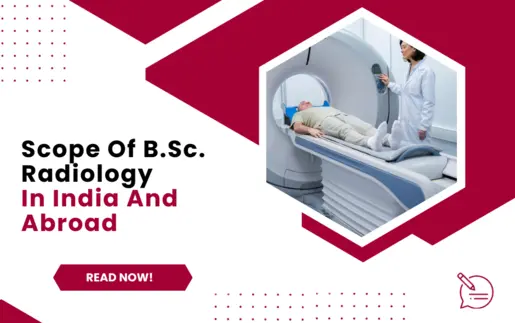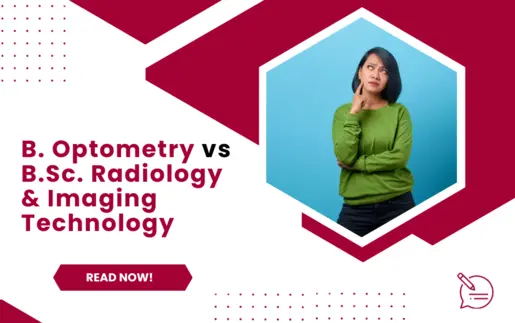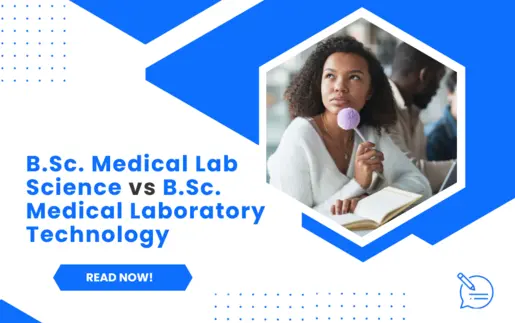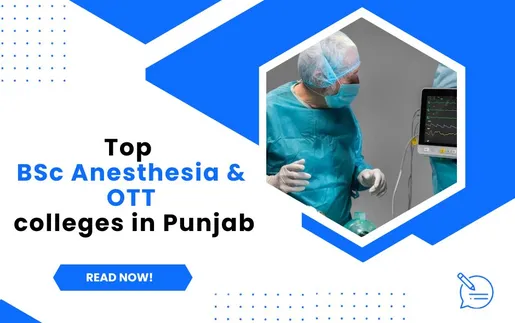Medical Courses After 12th Without NEET
Are you interested in a healthcare career? If so, choosing medical courses after 12th without NEET would be your best option. NEET is irrefutable as the gateway to medical courses, which makes it highly competitive. Don't worry. If you are uncomfortable clearing the NEET exam, there are many courses where you can get admission.
This blog will share insights on the best medical courses after 12th without NEET and help you take your first step towards your healthcare ambitions.
What is NEET?
The full form of NEET is the National Eligibility cum Entrance Test. This entrance exam is conducted by the National Testing Agency for medical aspirants. Appearing for this exam is necessary to be admitted to the MBBS program. To appear in this exam, you need to fulfill the following conditions:
- Must have passed 10+2 from a recognised board
- Must have passed 10+2 from the science stream and subjects like physics, chemistry and biology
- Must have scored minimum 50% marks in 10+2
Why is the NEET exam not required for specific medical courses?
There are a couple of reasons why the NEET exam isn't required for all medical courses in India:
- The focus of the Exam: NEET (National Eligibility Entrance Test) is designed to assess a student's preparedness for the demanding curriculum of MBBS (Bachelor of Medicine and Bachelor of Surgery) and BDS (Bachelor of Dental Surgery) programs. These programs involve direct patient care and require a strong foundation in core science subjects and the ability to handle the pressure of medical situations.
- Variety in Medical Fields: The healthcare sector offers a wide range of specialisations beyond direct patient care. Some courses, like the Bachelor of Pharmacy (B.Pharm) or Bachelor of Science in Nursing (B.Sc Nursing), focus on specific areas, such as drug development or clinical support. The NEET syllabus might be overly broad for these programs, and other selection methods might be more relevant.
- Alternative Selection Methods: Universities and colleges can set their admission criteria for these non-NEET medical courses. This allows them to consider factors like a student's performance in specific science subjects relevant to the chosen program or conduct their entrance exams.
Overall, NEET ensures a strong foundation for students entering highly competitive and demanding medical programs like MBBS. Other medical fields have different skill sets and knowledge requirements, allowing alternative selection processes.
Overview: Some Medical Courses After 12th Without NEET
| Course Name | Duration | Job Profile | Average Salary (INR) |
|---|---|---|---|
| B.Sc. Medical Lab Science | 3.5 years + Internship | Medical Laboratory Technologist | 3-5 Lakhs |
| B.Sc. Forensic Science | 3 years | Forensic Scientist, Crime Scene Investigator | 4-6 Lakhs |
| B.Sc. Optometry | 4 years | Optometrist | 5-7 Lakhs |
| B.Sc. Bio Technology | 3 years | Biotechnologist, Research Scientist | 3-5 Lakhs |
| B.Sc. Medical Technology - Anesthesia & Operation Theatre | 3 years + Internship | Operation Theatre Technician, Anesthesia Technician | 3-4 Lakhs |
| B.Sc. Radiology & Imaging Technology | 3 years + Internship | Radiology Technician, X-ray Technician | 3-4 Lakhs |
Advantages of Pursuing Medical Courses After 12th Without NEET
There are several advantages to exploring medical courses that don't require the NEET exam:
- Diverse Career Options: NEET focuses on MBBS and BDS, but the healthcare field is vast! These alternative courses open doors to exciting specialisations like Optometry, Medical Lab Science, or Biotechnology. You can find a path that aligns with your specific interests.
- Flexible Entry Requirements: The NEET is highly competitive. These alternative courses may have more relaxed entry requirements, focusing on your science background or conducting their entrance exams. This allows a broader range of students to enter the healthcare field.
- Specialised Training: These programs delve deeper into specific areas of healthcare. You'll gain in-depth knowledge and skills in your chosen field, making you a valuable asset in that particular area.
- Focus on Practical Skills: Many programs emphasise hands-on experience and practical skills development. This can prepare you for immediate job application after graduation.
- Reduced Stress: Preparing for the NEET can be stressful. Choosing a non-NEET medical course allows you to focus your energy on your chosen field and potentially experience less pressure during your studies.
- Fulfilling Career Path: Regardless of the specific course, you'll contribute to the healthcare sector and positively impact people's lives. This can be a highly rewarding career choice.
Eligibility for Medical Courses After 12th Without NEET
The eligibility criteria for medical courses after 12th without NEET can vary slightly depending on the specific program and university. However, here's a general guideline:
- Minimum Marks: You'll typically need to have passed your senior secondary exams (Class 12) with a minimum percentage of marks, often ranging from 50% to 70%. Specific mark requirements will depend on the university and course.
- Science Subjects: Most medical courses without NEET will require Physics, Chemistry, and Biology (PCB) as mandatory subjects in your 12th-grade studies. Some programs might also accept PCM (Physics, Chemistry, Math).
- Entrance Exams (Sometimes): While NEET isn't required, some universities might conduct their entrance exams for admission to these medical programs. These exams might test your knowledge in relevant science subjects or aptitude for the chosen field.
- Other Requirements: There could be additional requirements depending on the course. For instance, some programs might require a good score in English or a specific minimum score in a particular science subject (e.g., Biology for Nursing).
Here are some resources to help you find specific eligibility details:
- University Websites: Each university will have information about its admission process and eligibility criteria for particular courses on its official website.
- Course Information Brochures: Many universities publish brochures detailing their programs, often including eligibility requirements.
- Educational Consultancies: Educational consultants can guide various medical courses and their eligibility criteria.
Remember, checking the official university website or program brochure for the most up-to-date and accurate eligibility information is always best.
Top Medical Courses After 12th Without NEET
A B.Sc. in Medical Lab Science is a three-year undergraduate program that equips you to analyse body fluids and tissues in a lab setting. This scientific analysis plays a vital role in diagnosing and treating diseases. You'll learn about biochemistry, microbiology, and lab techniques to operate specialised equipment and interpret test results. Graduates can work as Medical Laboratory Scientists in hospitals, clinics, and research labs, performing tests, analysing results, and communicating findings to doctors.
- Eligibility: It typically requires completion of 10+2 (higher secondary education) in a science stream with Biology, Physics, and Chemistry (or similar subjects) as mandatory subjects.
- Duration: Usually a 3-year undergraduate program, sometimes offered as a 4-year program with an internship.
- Job Profile: Medical Lab Scientists perform diagnostic tests on blood, tissues, and other body fluids to aid in disease diagnosis and treatment monitoring. They work in hospitals, clinics, research labs, and pharmaceutical companies.
- Average Salary in INR: The average salary can range from INR 2 lakhs to 6 lakhs per annum, with experience and specialisation playing a role.
A B.Sc. in Forensic Science, a three-year undergraduate program, equips you to analyse evidence using scientific methods like biology, chemistry, and physics. Analysing fingerprints, DNA, ballistics, and other evidence from crime scenes helps solve crimes. Graduates work as Forensic Scientists in labs, government agencies, or research institutions, contributing to investigations and potentially providing expert testimony in court.
- Eligibility: Similar to B.Sc. In Medical Lab Science, completing 10+2 in the science stream with Biology, Physics, and Chemistry is often required. Some universities may accept students with Mathematics instead of Biology.
- Duration: Typically a 3-year undergraduate program.
- Job Profile: Forensic Scientists analyse evidence collected from crime scenes to aid in criminal investigations. They work in forensic labs, government agencies, and research institutions.
- Average Salary in INR: The average salary can vary depending on the employer and experience but can range from INR 3 lakhs to 8 lakhs per annum.
The four-year B.Optometry program equips students with the knowledge and skills to become optometrists, primary eye care providers who conduct eye exams, prescribe corrective lenses, diagnose and treat certain eye conditions, and provide pre-and post-operative care for eye surgery patients.
- Eligibility: Students must typically complete 10+2 with Biology, Physics, and Chemistry. Some universities may have their entrance exams.
- Duration: B. Optometry is usually a 4-year undergraduate program.
- Job Profile: Optometrists are primary eye care professionals who examine eyes, diagnose vision problems, and prescribe corrective lenses or medication for certain eye conditions. They can work in private clinics, hospitals, or retail optical stores.
- Average Salary in INR: The average salary for Optometrists can range from INR 4 lakhs to 7 lakhs per annum, with private practice potentially offering higher earning potential.
A Bachelor of Science in Biotechnology (B.Sc. Biotechnology) is a three-year undergraduate program that delves into the exciting world where biology meets technology. It focuses on applying biological principles and processes to develop new technologies and products that improve our lives.
Students in a B.Sc. Biotechnology program explores a fascinating blend of disciplines, such as genetics, microbiology, molecular biology, biochemistry, immunology, and bioinformatics. The curriculum equips them with the knowledge and techniques of biotechnological research and applications. This may involve genetic engineering, cloning, fermentation, tissue culture, bioinformatics, environmental science, pharmaceuticals, and agriculture.
A core component of B.Sc. Biotechnology programs emphasise laboratory work, hands-on experiments, and research projects. These provide students with practical skills and experiences that are valuable for their future careers in biotechnology.
- Eligibility: Completing 10+2 in a science stream with Biology is usually mandatory. Some programs may also require Physics and Chemistry.
- Duration: Typically a 3-year undergraduate program.
- Job Profile: Biotechnologists work in various fields, applying biological principles to develop new products or processes. They may be involved in research, development, quality control, or production in pharmaceuticals, food science, or forensics.
- Average Salary in INR: The average salary can vary depending on the industry and experience level but can range from INR 3 lakhs to 8 lakhs per annum.
B.Sc. Medical Technology - Anesthesia & Operation Theatre
A Bachelor of Science in Medical Technology - Anesthesia & Operation Theatre (B.Sc. Medical Technology - Anesthesia & Operation Theatre) is an undergraduate degree program that prepares students for a career in perioperative care, which encompasses the care of patients before, during, and after surgery.
Graduates of this program are known as anaesthesia and operation theatre technologists or peri-operative technicians. They work as part of a surgical team alongside surgeons, anesthesiologists, and nurses to ensure the smooth running of surgical procedures and patient safety.
Eligibility:
- Completing 10+2 (higher secondary education) in science stream with Physics, Chemistry, and Biology is generally required. Some universities may have a minimum percentage requirement (like 50%).
- A few universities might have their entrance exams for this specific program.
Duration:
- Typically, a 4-year undergraduate program.
Job Profile:
- Graduates work as Anesthesia and Operation Theatre Technologists, assisting qualified medical professionals during surgeries.
- Responsibilities include:
- Preparing the operation theatre for surgery.
- Maintaining and sterilising surgical instruments and equipment.
- Assisting the Anesthesiologist with anaesthesia administration and monitoring patients during surgery.
- Providing post-operative care in the recovery room.
Average Salary in INR:
- The average salary can range from INR 3 lakhs to 5 lakhs per annum, with experience and specialisation playing a role.
B.Sc. Radiology & Imaging Technology
A Bachelor of Science in Radiology & Imaging Technology (B.Sc. RIT) is a three or four-year undergraduate program that equips students with the knowledge and skills to operate sophisticated imaging equipment and produce high-quality images for medical diagnosis.
Graduates of this program, known as radiology technologists or imaging technologists, play a crucial role in healthcare by assisting physicians in diagnosing and treating various medical conditions.
Eligibility:
- Completing 10+2 (higher secondary education) in the science stream with Physics, Chemistry, and Biology is often required.
- Some universities may accept students with Mathematics instead of Biology.
Duration:
- A 3-year undergraduate program is sometimes offered as a 4-year program with an internship.
Job Profile:
- Graduates work as Radiology and Imaging Technologists, operating various imaging equipment, such as X-ray machines, CT scanners, and MRIs.
Responsibilities include:
- Positioning patients for imaging procedures.
- Operating the imaging equipment and ensuring high-quality image generation.
- Maintaining and ensuring safety protocols for the equipment.
- It may also assist radiologists in some procedures.
Average Salary in INR:
- The average salary can range from INR 3 lakhs to 6 lakhs per annum, with experience and specialisation playing a role.
High Salary Medical Courses After 12th Without NEET
Optometry (B.Optom): Optometrists provide primary care for the eye. They can perform eye exams, prescribe glasses and contacts, and diagnose and treat some eye diseases.
Occupational Therapy (BOT): Occupational therapists help people regain independence after an injury, illness, or disability. They can teach patients new skills, such as dressing or cooking, and help them modify their homes to make them more accessible.
Speech Language Pathology (B.Sc SLP): Speech-language pathologists diagnose and treat speech and language disorders. They can work with people of all ages, from infants to adults.
Audiology (B.Sc. Aud): Audiologists diagnose and treat hearing and balance problems. They can fit people with hearing aids and other assistive devices.
Medical Lab Technology (BMLT): Medical laboratory technicians perform tests on blood, tissue, and other body fluids to help diagnose diseases.
Radiography (B.Sc. Radiography): Radiographers create images of the body using X-rays and other imaging technologies for diagnostic purposes.
Operation Theatre Technology (B.Sc. OTT): Operation theatre technologists assist surgeons during surgery. They prepare the operating room, sterilise instruments, and drape the patient.
Anesthesia Technology (B.Sc. AT): Anesthesia technologists administer anaesthesia to patients before, during, and after surgery.
Perfusion Technology (B.Perfusion): Perfusionists operate the heart-lung bypass machine during surgery.
Prosthetics and Orthotics (B.PO): Prosthetists and orthotists design and fit artificial limbs and braces for people who have lost limbs or have difficulty moving.
Public Health (MPH): Public health professionals protect community health. They can work in various settings, including government agencies, non-profit organisations, and research institutions.
Hospital Management (MHA): Hospital administrators oversee the day-to-day operations of hospitals. They are responsible for budgeting, staffing, and ensuring that the hospital provides quality care to patients.
Medical Coding and Billing: Medical coders and billers assign codes to medical procedures and diagnoses to reimburse insurance companies.
Clinical Research: Professionals design and conduct studies to test new drugs and treatments.
Healthcare Marketing: Healthcare marketers develop and implement marketing plans to promote healthcare products and services.
Pharmaceutical Sales: Pharmaceutical sales representatives sell prescription drugs to doctors and other healthcare providers.
Medical Writing: Medical writers write educational materials for healthcare professionals and patients.
Medical Equipment Sales: Sales representatives sell medical devices and equipment to hospitals, clinics, and other healthcare providers.
These are a few examples of Medical Courses After 12th Without NEET. Each course offers a rewarding career for candidates interested in healthcare and helping others. Studying each option and choosing a career path that aligns with your goals and aspirations is necessary. CGC Jhanjeri is one of the top colleges in Punjab, and it is well known for its state-of-the-art infrastructure and experienced faculty. Admissions are open at CGC Jhanjeri. You can secure a seat by filling out an admission form on their official website and visiting their admission cell.
FAQs
1. Which course is best after 12th medical without NEET?
Several options offer promising careers if you're looking for a medical-related course after 12th without taking NEET. Some of the best alternatives include:
- B.Sc. Medical Lab Science: Involves laboratory work and diagnostics.
- B.Sc. Forensic Science: Focuses on criminal investigations and forensic techniques.
- B.Sc. Nursing: A crucial part of the healthcare system, providing patient care.
- B. Pharmacy: Study of pharmaceuticals, drugs, and healthcare.
- BPT (Bachelor of Physiotherapy): Focuses on physical therapy and rehabilitation.
- D. Pharmacy (Diploma in Pharmacy): Shorter duration, leads to pharmacy practice.
2. Which is the highest paid job without NEET?
Among the highest-paid jobs in the medical field without NEET, Pharmacists stand out, especially after pursuing a B. Pharm or M. Pharmacy. Another well-paid profession is a Biotechnologist, where advanced studies in Biotechnology can lead to high-paying jobs in research and pharmaceutical companies. Medical Lab Technologists and Clinical Research Analysts are also lucrative career paths that don't require NEET.
3. Can I join a medical college without NEET?
Yes, you can join medical-related colleges without NEET for non-MBBS courses. Several paramedical and allied healthcare programs, like B.Sc. Nursing, B. Pharmacy, BPT, and B.Sc. Medical Lab Science, are available at medical colleges that do not require NEET scores. These courses are vital in the healthcare system and offer promising career opportunities.
4. Which medical course is best for salary?
For high salaries in the medical field without NEET, B. Pharmacy and M. Pharmacy are some of the best options, particularly for those who go into pharmaceutical research or establish their pharmacy businesses. Additionally, B.Sc. Biotechnology professionals often earn well in research and biotechnology firms. Physiotherapists (BPT) and Medical Lab Technologists can also command strong salaries, especially with experience and advanced qualifications.



















